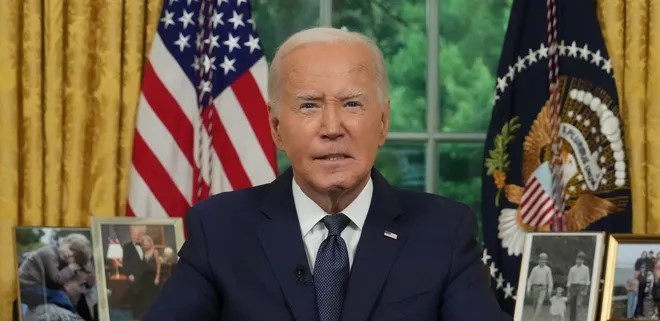Speaking on the Union Budget in Lok Sabha, the Leader of the Opposition attacked Modi and said that farmers, workers, and youngsters of the nation are terrified…reports Asian Lite News
Drawing parallels from the Mahabharata, the Leader of Opposition, Rahul Gandhi, on Monday attacked the Bharatiya Janata Party over the Union Budget and said that there’s an atmosphere of fear in the country, adding that the country is now trapped in a “Chakravyuh of lotus,” referring to the BJP’s symbol.
Speaking on the Union Budget 2024 in the Lok Sabha, the Leader of the Opposition attacked Prime Minister Narendra Modi and said that farmers, workers, and youngsters of the nation are terrified.
“In the last speech, I spoke about some religious concepts. Shivji’s concept and concept of Ahinsa is that the trishool is placed behind the back and is not held in the hand. I spoke about the snake on Shivji’s neck and I also said how all religions in our country proposed the idea of non-violence, which can be capsulated in the phrase Daro mat Darao mat. I also said that there is an idea beyond the personal. The idea of the Abhay Mudra is that transmits this motion of Ahinsa and affection and fearlessness to everybody else. There is an atmosphere of fear, dar ka mahool hai Hindustan main. My friends are smiling but they are also scared. Budget par hi bol raha hu sir. Sir, you see the problem in the BJP: only one man is allowed to dream of being Prime Minister. If the Defence Minister decides he wants to be Prime Minister, there is a big problem–there is fear. So there is fear in the country. The question I was asking myself was: Why is this fear spreading so deeply? Why is it that my friends in the BJP are terrified, the ministers are terrified, the farmers of India are terrified, and workers and youngsters are terrified,” Rahul Gandhi said.
Rahul Gandhi criticised the Prime Minister for prominently displaying the lotus symbol and claimed that a new Chakravyuh had been created in the 21st century.
“Thousands of years ago, in Kurukshetra, six people trapped Abhimanyu in a ‘Chakravyuh’ and killed him. I did a little research and found out that ‘Chakravyuh’ is also known as ‘Padmavuyh’ – which means ‘Lotus formation’. Chakravyuh’ is in the shape of a Lotus. In the 21st century, a new ‘Chakravyuh’ has been formed – that too in the form of a Lotus. The Prime Minister wears its symbol on his chest. What was done with Abhimanyu, is being down with India – the youth, farmers, women, small and medium businesses. Abhimanyu was killed by six people. Today, too there are six people in the centre of ‘Chakravyuh’. Six people control India today too -Narendra Modi, Amit Shah, Mohan Bhagwat, Ajit Doval, Ambani and Adani,” he added.
Intervening in between Lok Sabha Speaker Om Birla said “You are on the Constitutional post. Many of your leaders have given me in the writing that jo maniye sadash is sadan la sadash nhi hai uska naam nhi laina hai. This is wrong. From the Leader of the Opposition, I expect that he will follow all the rules and regulations. I expect. You may not follow but I expect this from you.”
After Speaker Om Birla’s intervention, LoP said, “If you want, I will omit the names of NSA, Ambani and Adani, and take just 3 names. If you want, I will use only three names.”
The LoP said that the budget has stabbed the middle class, which enthusiastically banged thalis when asked to do so by Prime Minister Modi.
“The Chakravyuh that has captured India has three forces behind it: first is the idea of monopoly capital, that two people should be allowed to own the entire Indian wealth. So one element of Chakravyuh is coming from the concentration of financial power. I am explaining the Budget. The second element is the agencies, institutions, CBI, ED, and Income Tax departments of the nation and the third is the political executive. These three together are at the heart of the Chakravyuh and they have devastated this country,” he said.
“My expectation was that this budget would weaken the power of this ‘Chakravyuh’, that this budget would help the farmers of this country, would help the youth of this country, would help the labourers, and the small businesses of this country. But what I have seen is that the sole aim of this Budget is to strengthen this framework – a framework of monopoly business, of a political monopoly that destroys the democratic structure and of the deep state and the agencies. The result of this has been – those who gave employment to India, small and medium businesses, were attacked through demonetisation, GST and tax terrorism,” he added.
The LoP said that the ‘Chakravyuh’ that the central government has built is harming crores of people.
“The ‘Chakravyuh’ that you have built is harming crores of people. We are going to break down this ‘Chakravyuh’. the biggest way of doing this, one that scares you, is the Caste Census. Like I said that INDIA Alliance will pass a guaranteed legal MSP in this House, similarly, we will pass Caste Census in this House, whether you like it or not,” he said.
Rahul Gandhi slammed the Centre over the internship announcement in the Budget in which the youths will get the opportunity to do internships in the top 500 companies of the country. (ANI)











